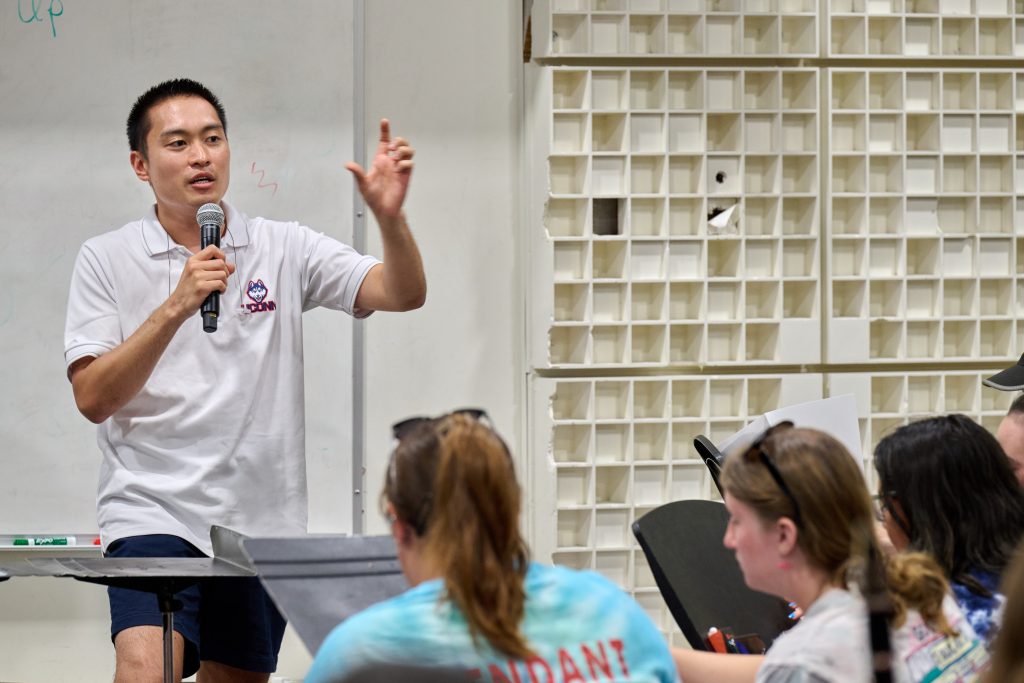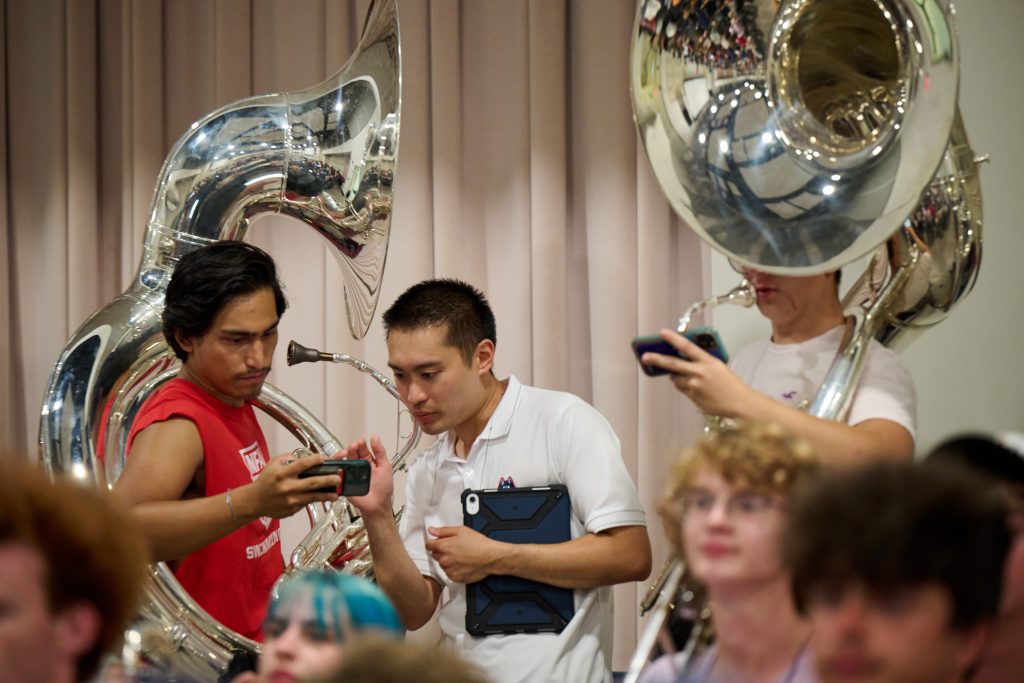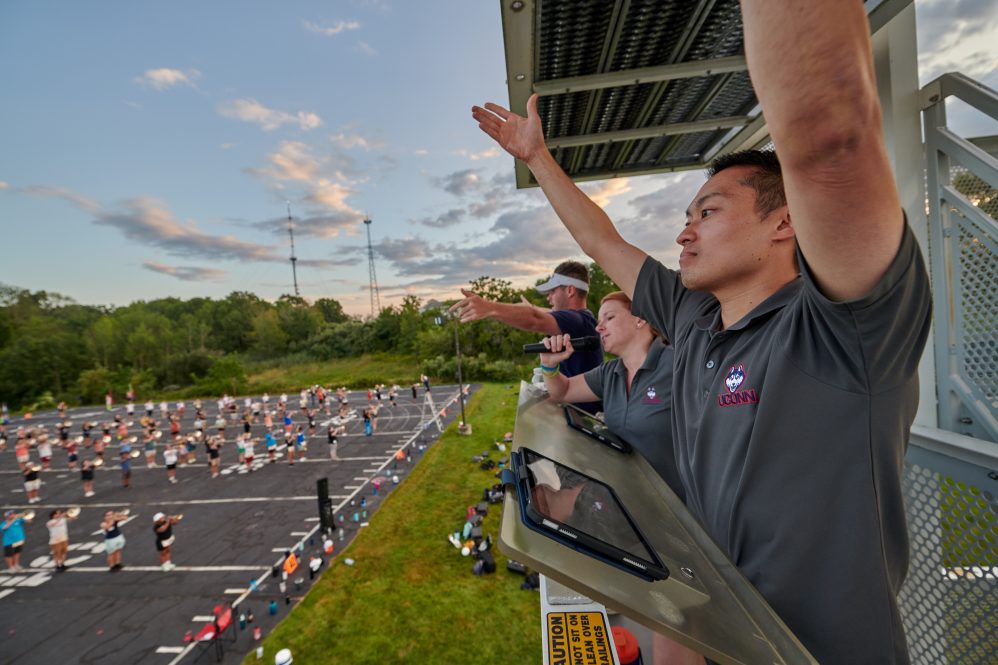Fourteen years ago, a piece of the UConn Marching Band got left behind in South Bend, Indiana.
Justin McManus ’11 (SFA, ED), ’13 MM was still in his undergrad in 2009, working as a student manager for the UCMB after having marched in the tuba section the previous two. He was getting ready to take the lead as drum major in 2010 while gaining experience with band logistics and equipment management.
Alongside UConn football players, marching band members traveled that November to the University of Notre Dame for a game that earned the Huskies a 33-30 victory over the Fighting Irish. One of McManus’ tasks was to maintain the band’s water jugs, the equipment management part of his job.
Only, in the excitement of that hard-fought win, McManus left one behind.
Four years on and now with a graduate degree, McManus moved west in 2013 for his first professional job: assistant director of university bands at Notre Dame.
“When I started, the operations manager came up to me, handed me the jug, and said, ‘You left this here.’ That’s when I knew the job was meant to be,” he says of his start at Notre Dame. “I was meant to come back four years later and get the water jug that I’d left behind.”
He says he came full circle that day – but in 2013 he’d really come only 180 degrees.
Full circle happened this spring when McManus returned to Storrs to head the UCMB, a position held by McManus’ mentor and longtime marching band director David Mills until his retirement last year.
“How do you carry on a legacy from somebody who’s done so much,” McManus says of his respect for Mills. “This first year, I’m going to do a lot of listening and watching. David did amazing things here and I want to see what’s working and what’s taking the program to new heights.”
McManus, who ended up spending nine years at Notre Dame, says this year’s UCMB show, “Life Animated,” is more than just a representation of new life in the UCMB leadership team. It’s also emblematic of life becoming busier and more animated in the wake of pandemic idleness.
The last several years have been challenging for bands in general as membership numbers dipped during social distancing and time apart. Lately, the focus for most, no matter the sort – concert, orchestra, community, or marching – has shifted to rebuilding and retaining.
For the first time in years, the UCMB membership roster now tops 300, McManus says.
“This year, we’re sending the message that we’re back after COVID and breathing life continually into the program,” he says. “This idea of breath and breathing is so integral to music. As musicians, we spend so much time thinking about breath and life. Our show aims to animate our spirits and souls through music.”
With themes from the “Power Rangers” and “Cowboy Bebop,” the show also includes Stevie Wonder’s “Living for the City,” Elton John’s “Rocket Man,” and Bill Chase’s “Get It On.” As usual, the band will perfect a full exhibition show and borrow parts to pair with other tunes to form unique halftime shows for each football game.
“We kind of mix and match our shows so students can keep the music and movements in their memory but also have variety in what they’re playing. It also gives our fans some variety in what they’re hearing,” McManus says, noting the Military Appreciation Day show on Sept. 23 will look different than the one on Sept. 16 for Band Day, for instance.

Expanded engagement with student fans and the broader community is one thing McManus says he hopes to develop this year. He’d like students outside the band to help create some new cheers and would like to get the UCMB into more Connecticut communities, if not across state lines.
“Athletic bands and marching bands nationally are known for their ability to be ambassadors for a university. They’re physically usually the biggest group on campus in terms of student groups and clubs,” he says. “For many people in the community, one simple interaction with a band member might be the first or only time they interact with someone from the institution. Let’s take that, let’s build on that.”
He also says he wants to expand on existing relationships with alumni and become more involved in alumni events, improve the band practice field to better align with institutional peers, and urge individual members to look inward at how they treat, work with, and befriend each other.
“Marching band provides, in both the literal and metaphorical senses, the opportunity to be seen and heard, especially for students who might not feel that in other parts of their life. To come to band practice or to football or basketball games, to put the uniform on, and to be contributing to this bigger thing and be seen by others and by your peers is something very powerful,” he says.
Finding a Home at UConn
McManus grew up in Torrington, where he started learning music in public schools first on the recorder, then clarinet, and later bassoon. In high school, he rose the ranks and served as drum major of The Pride of Torrington marching band under the direction of Wayne Splettstoeszer who, he says, “sparked my passion for music teaching and demonstrated the importance of leading with integrity.”
He says he was drawn to music because it gave him a place to express himself. A self-described introvert, he didn’t know what he wanted to do in life. Maybe law school. Maybe culinary school. Maybe music school.
The elementary, middle, and high school teachers who helped build his foundation prepared him well for whatever would come next, he says, expressing a “deep appreciation” for all they do for all students.
“Once I stepped foot on UConn’s campus, though, I realized this was home,” he says. “Just the warmth that I saw from the staff and the professors, but also how bonded we were as students, it immediately felt like it was a place where I belonged.”
It also was a place he stayed: five years for two bachelor’s degrees in music and music education, then two more years for a master’s in music performance. In late 2012, as the last semester of his master’s program closed in, McManus says he applied for the Notre Dame job on a lark and getting it was a shock.
“There were several times when Notre Dame and UConn met for women’s basketball while I was there,” he says. “It was fun to work with the Notre Dame students and some students I had at UConn. I remember going to some dinners and they’d joke, ‘No, he’s on our side. No, he’s on our side.’ The greatest aspect of these tournaments and games was watching students passionately cheer and play for their teams. Band students experience their institutions in very special and unique ways.”
In 2017, McManus started chipping away at a doctorate at Boston University, which he finished in 2022. His describes his dissertation as looking at “how students from diverse gender and sexual backgrounds navigate musical spaces, especially marching band, which can be seen as a really regimented militaristic thing. But it also can be a welcoming and open space for folks who are at different stages of identity development.”
Then came the pandemic, personal reflection, and a call from family to come back to the East Coast.
McManus left higher education and music for a year to work in Washington, D.C., and indulge his interest in politics and law. He meant to begin a new life there but started thinking about what could be when he returned to Connecticut in fall 2022 as a UCMB alum to celebrate Mills’ retirement.
Having experience in the UCMB as member, student manager, drum major, drill instructor, and pep band director throughout his undergrad and graduate years, gave him special insight into its inner workings. Being from Connecticut made him a native who understands the sometimes-striking differences of a small state.
Notre Dame offered him a place at the helm of the oldest continuously operating college band in the United States – one that earned the Sudler Trophy, the highest marching band honor, in 2011-12.
McManus says he saw opportunity at UConn and with The Pride of Connecticut band and applied for the director of athletic bands position. The prospect of joining the music department faculty in the School of Fine Arts as assistant director of wind bands and assistant professor of music, alongside both new and seasoned instructors, also was exciting.
‘Assume best intent in everyone’
All the lessons learned from that previous experience come with him, he says.
“The biggest thing is remembering that while collectively we may produce a piece of music, at the end of the day we are a group of people. There’s something unique about marching band as a place where you come as a person and contribute to something that’s larger than yourself,” he says.

When he was drum major, McManus says he tried to do something as simple as remember people’s names. So, instead of calling out from the podium, “A62, you’re out of step,” he’d talk directly to the person, using their first name.
Personal connection is a big thing, especially in a big organization, he says. It’s equally important to remember the UCMB comprises 300-plus individual members.
“They each have a story,” McManus says. “They have joys and triumphs and tragedies and struggles. That’s the most important thing I learned as drum major. They’re not just members of the band. They’re roommates, club leaders, orientation leaders. They’re in different rec sports and activities. They’re studying hard in the classroom. They’re getting top grades and honors and going into amazing careers whether in music or not.
“I also learned that everyone, at the end of the day, is really trying to do the right thing, even if their path to the right thing looks different than yours,” he continues. “To assume best intent in everyone is important, whether at a staff level or student level. When you put that many motivated, smart, ambitious people in a room, there are going to be different opinions on which is the right path. But if we assume best intent of someone else, they’ll assume best intent from me.”
For McManus it all comes down to respect, patience, and resilience.
“Working to build something great takes a lot of hard work,” he says, adding of marching band, “it’s a long game, this idea of putting in work and not seeing results right away, having the fortitude to put in the work incrementally and see the result in two or three months.”
He refers to its members as athletes who must take care of their bodies off the field to do their best on the field. In all kinds of weather. Surrounded by teammates. Each one moving this way or that while recalling the next note to play.
It’s little wonder a water jug stamped with “UConn Marching Band” is so important – and still at Notre Dame where he left it for a second time, this one purposefully.
“On a base level, regardless of institution, among band students and music students there’s this common thread of kinship and social connection, of building something great together. That connects people regardless of where they are. Whether you’re at Hawaii, Michigan, Florida State, Texas, or Connecticut, there’s certain threads that all band students and all music students share,” he says.



